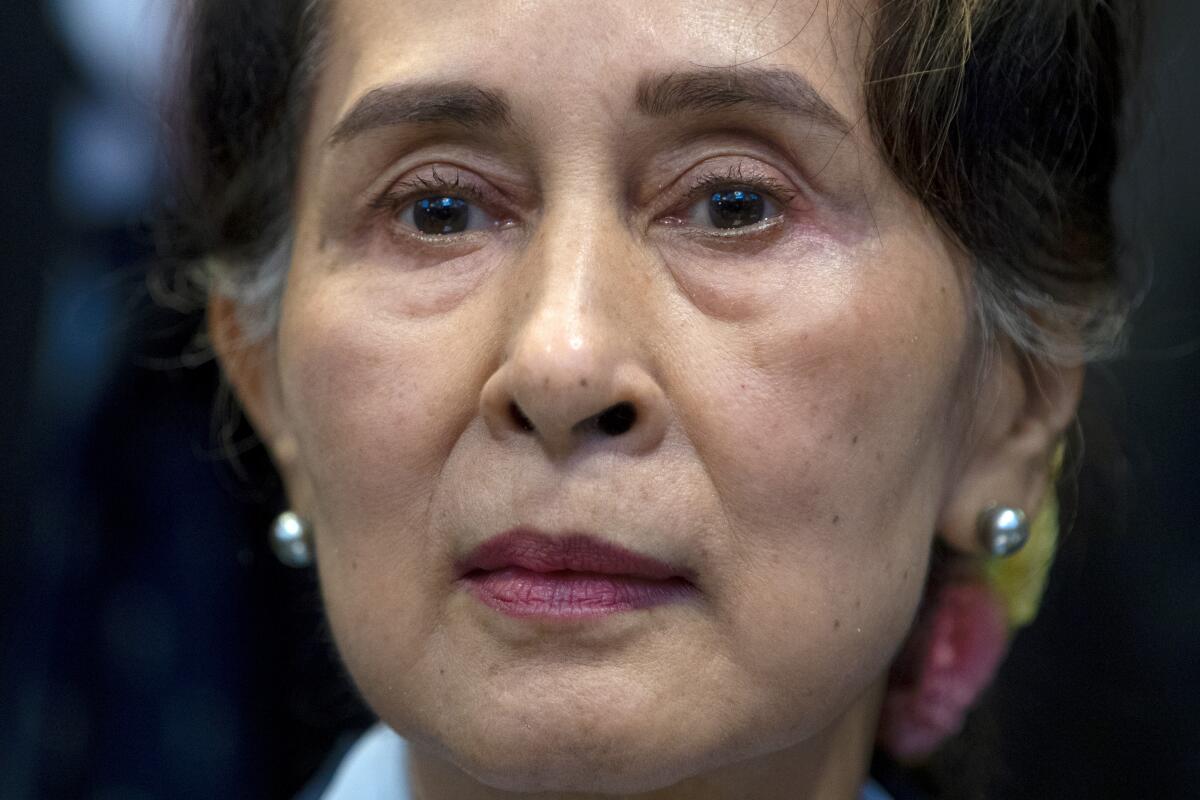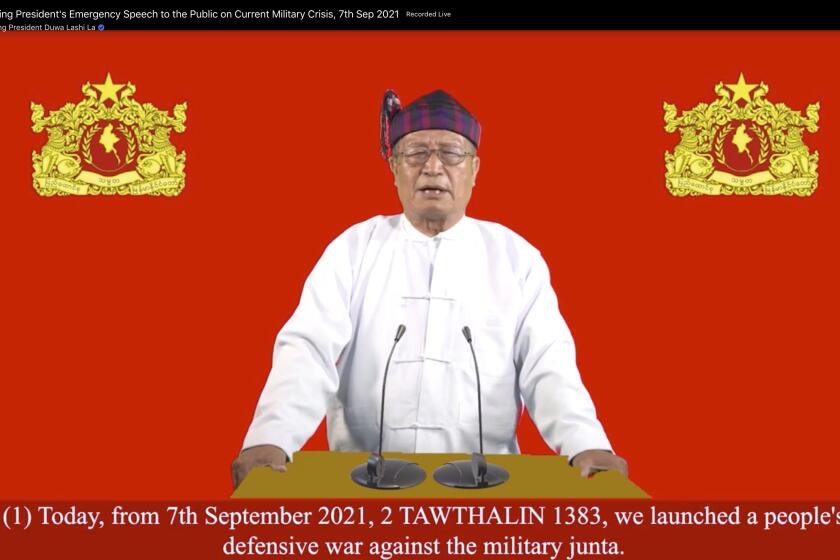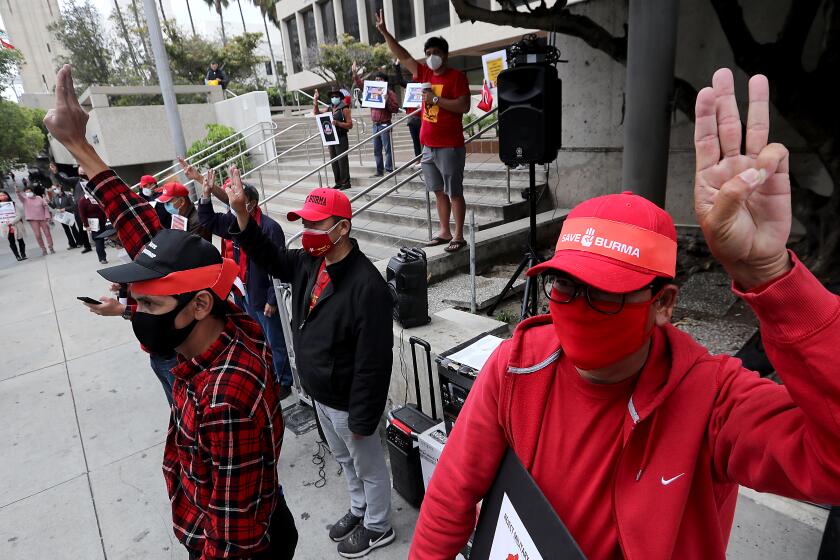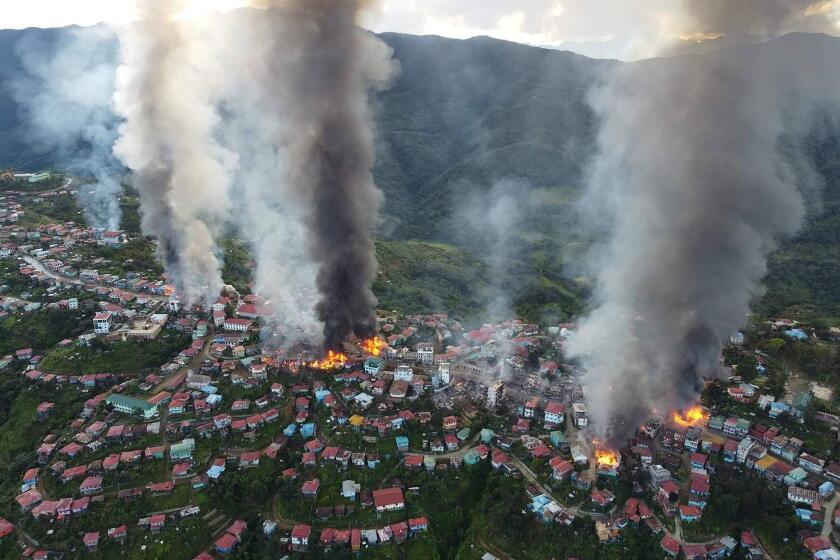Myanmar sentences Aung San Suu Kyi; more verdicts expected

SINGAPORE — A court in Myanmar sentenced civilian leader Aung San Suu Kyi on charges of inciting violence and violating COVID-19 rules, dealing another blow to democracy in a country plunged into chaos by a military coup.
Suu Kyi was initially sentenced to four years in prison Monday, but the military government later reduced the sentence to two years under house arrest, according to state-owned media.
The sentence is expected to be the first of more to come; Suu Kyi is facing 11 charges in total, including for corruption and the sharing of state secrets. If found guilty of all charges, the 76-year-old Suu Kyi faces more than 100 years behind bars.
“It was already clear from day one of the coup that Aung San Suu Kyi was to be silenced, locked away indefinitely on trumped-up charges. So these verdicts come as no surprise,” said Richard Horsey, an analyst on Myanmar at the International Crisis Group. “They are an attempt to demonstrate the military’s power: that they can incarcerate an incredibly popular leader and ignore the will of the country.”
Suu Kyi was tried in a special court in Naypyidaw, Myanmar’s spartan capital, in proceedings barred from public view. Her attorneys were prohibited from speaking to the media.
The reduction of her sentence suggests that the junta is trying to temper the international response to her jailing or is under pressure from China to moderate its crackdown on dissent, experts say.
“I think the junta really fears what would come next by putting heavy charges against Aung San Suu Kyi,” said Hunter Marston, a Canberra, Australia-based scholar of Southeast Asian politics, specializing in Myanmar.
Months after the Feb. 1 coup, citizens are fighting back against Myanmar’s brutal military. Many say international pressure has yielded no results.
Suu Kyi was detained Feb. 1 when the military swept across the country arresting members of the democratically elected government led by Suu Kyi’s National League for Democracy party, including President Win Myint.
That set off months of protests that were violently crushed by troops ordered to fire automatic weapons on mostly peaceful demonstrators. An estimated 1,300 people have been killed and thousands more arrested, according to one human rights group.
In the most recent show of brutality, a speeding military vehicle rammed a crowd of anti-junta protesters in Yangon on Sunday, killing five people and injuring at least 15. Video of the attack shared online showed victims splayed on the road.
Despite the use of excessive force, the military government led by Senior Gen. Min Aung Hlaing faces a crisis of authority. Guerrilla fighters and ethnic rebel groups in the country’s borderlands are posing a greater challenge than expected. Sporadic bombings and assassinations targeting soldiers and the junta’s supporters in several cities have diminished morale in the ordinarily tightly controlled military, fueling defections.
Burmese in the U.S. are protesting the brutal crackdown and urging global intervention. But it’s hard to overcome a lack of knowledge and interest.
Worsening the crisis is Myanmar’s free-falling economy, which will thrust nearly half of the nation’s 55 million people into poverty by early next year, according to a recent United Nations report.
Apart from tacit support from China, India and Russia, the military government finds itself diplomatically isolated, having failed to win recognition from the United Nations and after being barred from attending the biannual Assn. of Southeast Asian Nations summit in October.
Min Aung Hlaing, who named himself prime minister of a caretaker government in August, said Myanmar will hold elections by 2023.
The punishment of Suu Kyi now allows the military to run without having to face a galvanizing leader whose party twice won general elections in landslides in 2020 and 2015 at the expense of the military-backed Union Solidarity and Development Party.
Breaking News
Get breaking news, investigations, analysis and more signature journalism from the Los Angeles Times in your inbox.
You may occasionally receive promotional content from the Los Angeles Times.
Myanmar, also known as Burma, lived under a military dictatorship for nearly five decades until democratic reforms were introduced in 2011. That ushered in a new era of economic development, civil society and contact with the outside world. The army, known as the Tatmadaw, however, still clung to power by giving its political representatives veto power in parliament — blocking the civilian government from reforming the country’s constitution.
Suu Kyi is the daughter of Burmese independence leader Aung San, who was assassinated in 1947 shortly before Britain relinquished control of the former colony.
She rose to prominence when she returned to Burma in 1988 from Britain and rallied pro-democracy supporters in Yangon, also known as Rangoon, and helped establish the National League for Democracy.
Her activism was considered especially dangerous to the Tatmadaw because of her family background. Suu Kyi would spend a total of 15 years under house arrest between 1989 and 2011. She won the Nobel Peace Prize in 1991.
The U.N.’s humanitarian chief is urging Myanmar’s military junta to allow unimpeded access to more than 3 million people in desperate need of help.
Critics say the adoration for Suu Kyi from the West was misplaced, particularly as she did little to stop the military’s deadly campaign against the Rohingya in 2016, which drove more than 700,000 of the Muslim ethnic minority into refugee camps across the border in Bangladesh. In 2019, she defended the military at The Hague against charges of genocide.
Still, Suu Kyi commanded massive popularity among many members of Myanmar’s majority Buddhist Bamar population. Protesters were regularly seen carrying pictures of Suu Kyi this year. Attitudes have shifted now that remnants of the deposed civilian government have formed a parallel government in hiding emphasizing greater ethnic unity and regret for the treatment of the Rohingya.
“She is a symbol of democracy for us,” said a 24-year-old resident of Yangon, who declined to give her name because of her participation in anti-coup demonstrations. “But she’s not the only one who can represent us. Myanmar is a diverse country. We need a collective government based on a federal system where every ethnic group is involved.”
Times staff writer Pierson reported from Singapore and special correspondent Kyaw Hsan Hlaing from Bangkok, Thailand.
More to Read
Sign up for Essential California
The most important California stories and recommendations in your inbox every morning.
You may occasionally receive promotional content from the Los Angeles Times.














